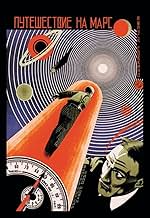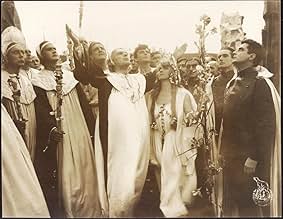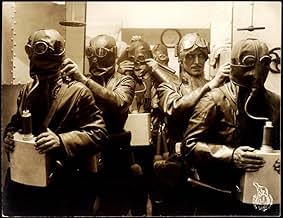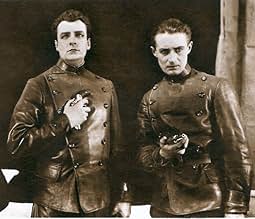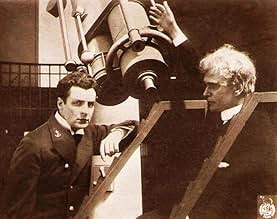A group of researchers from Earth travel in a spaceship to Mars, where, to big surprise, they find a peaceful vegetarian and pacifist civilization.A group of researchers from Earth travel in a spaceship to Mars, where, to big surprise, they find a peaceful vegetarian and pacifist civilization.A group of researchers from Earth travel in a spaceship to Mars, where, to big surprise, they find a peaceful vegetarian and pacifist civilization.
Nils Asther
- Wounded Martian Citizen
- (uncredited)
Alfred Osmund
- Martian Priest
- (uncredited)
Featured reviews
Sci-fi is a rapidly changing genre. It loses impact even more rapidly than horror. Therefore it's virtually impossible to see a sci-fi movie from the past (from the pre-space period, i.e. late 50s) that isn't laughable in some sense. First serious sci-fi epics appeared in the very early 50s, and bearing in mind the first space yarn was filmed by Melies in 1902, we get about 50 years of sci-fi without the very basic concepts of space travel. Where The Trip To The Moon can be dismissed as a funny experiment, The Trip To Mars cannot. This is a serious film. The makers didn't know about weightlessness or the absence of atmosphere in space, plus about a hundred more things we know today. That was the period, when everybody was raving about the channels on Mars, so they naturally assumed there was intelligent life on that planet. Melies shows frogmen and other strange creatures on the Moon; in 1924 there appears the still popular tinfoil dress for Martians in Russian film Aelita. So, in between, we get the Egypto-Greek fairy-tale world of this film: wise old priests being wise; and virgins prancing around, praising virtue in the world, where virtue obviously is as normal and unnoticeable as metabolism. Enter the Earthlings, introducing death and sin. Well, nothing spectacular follows: they soon are "cured" and learn the ways of the righteous. This film is a total orgy of enjoyment. The double feature released by the Danish Film Institute (together with a disaster film from 1916, The End Of The World) boosts their usual superior quality. The Danes began storing and archiving their films very early, so you get a very clean second generation copy from a period when most of US films withdrawn from circulation went to the glue or comb factory. It's a pity this film with so many different locations isn't color tinted. The rather uninspired piano accompaniment, another trade mark of the series from the DFI, tends to grow a bit tedious too. But nevertheless, a remarkable film and something you can show to your friends without being afraid that they'll think you're a weirdo.
The only time I've seen this rare Scandinavian foray into sci-fi territory mentioned anywhere - prior to its DVD availability courtesy of the Danish Film Institute - was in a literate appraisal of the genre by noted critic Philip Strick (who, incidentally, passed away recently). This alone would make it interesting and a film to seek out - but, alas, while undeniably good to look at (a traditionally Danish quality, I might add), dramatically it turned out to be a major disappointment!
Apart from being technically stilted and plagued by the exaggerated gestures of the actors (a well-established liability of most Silent-era product), it also presents a totally different view of Mars and its inhabitants to the one we've grown accustomed to seeing in later American films tinged by paranoia. Not only is there no concentrated effort to show an alternative landscape for the red planet, but the Martians themselves are merely benevolent humans fitted in Roman-era attire (with the addition of some outlandish accoutrements): apparently, they were once as 'barbaric' as us but have gradually attained enlightenment - and, though their language is different from that of their earthly visitors, they're somehow able to transmit their thoughts to them! In essence, it's clear that the film is infused with the last remnants of 19th century Romanticism (some of the title cards are unbelievably hokey) which Weimar Germany and, then, the Wall Street crash helped eradicate - leading to a change in the general attitude of cinema.
The ultimate intent of the picture, obviously, was a general plea for tolerance and understanding (WWI was still raging when the film emerged); however, while certainly watchable (and short enough at 81 minutes not to lapse into boredom), the almost total lack of tension between the inhabitants of the two planets - where, back home, it's represented by the ripe but highly amusing villainy of a Mephistophelean character who, eventually, gets his just desserts by way of a lightning bolt! - makes for an altogether dull narrative. Besides, virtually none of the occupants of the vessel - which itself constitutes nothing more fanciful than an airship - who have been assembled from all over the world (and are contemplating mutiny against their stoic captain when the journey takes longer than expected!) get to do much of anything once they land on Mars!!
Apart from being technically stilted and plagued by the exaggerated gestures of the actors (a well-established liability of most Silent-era product), it also presents a totally different view of Mars and its inhabitants to the one we've grown accustomed to seeing in later American films tinged by paranoia. Not only is there no concentrated effort to show an alternative landscape for the red planet, but the Martians themselves are merely benevolent humans fitted in Roman-era attire (with the addition of some outlandish accoutrements): apparently, they were once as 'barbaric' as us but have gradually attained enlightenment - and, though their language is different from that of their earthly visitors, they're somehow able to transmit their thoughts to them! In essence, it's clear that the film is infused with the last remnants of 19th century Romanticism (some of the title cards are unbelievably hokey) which Weimar Germany and, then, the Wall Street crash helped eradicate - leading to a change in the general attitude of cinema.
The ultimate intent of the picture, obviously, was a general plea for tolerance and understanding (WWI was still raging when the film emerged); however, while certainly watchable (and short enough at 81 minutes not to lapse into boredom), the almost total lack of tension between the inhabitants of the two planets - where, back home, it's represented by the ripe but highly amusing villainy of a Mephistophelean character who, eventually, gets his just desserts by way of a lightning bolt! - makes for an altogether dull narrative. Besides, virtually none of the occupants of the vessel - which itself constitutes nothing more fanciful than an airship - who have been assembled from all over the world (and are contemplating mutiny against their stoic captain when the journey takes longer than expected!) get to do much of anything once they land on Mars!!
Years before the movie serial Flash Gordon came upon the scene, the first science-fiction space opera was Denmark's February 1918 "A Trip To Mars." Produced during the middle of World War One, the movie paints a utopian vision of peace & love on the planet Mars from its inhabitants. The line "Love is the Force you call God" is repeated several times, illustrating how screenwriter Ole Olsen felt Earthlings needed to be reminded of that lesson while the European carnage was happening next door to Denmark.
It has been noted "A Trip To Mars" is the first science fiction feature-length movie ever produced. There have been earlier alien-encounter films on Mars and the Moon released, but they were "shorts." The Mars journey the Danes created here was made at a time when lines thought to be canals existing on the planet could be seen from our best telescopes, hinting there was a sophisticated alien life there. When the movie's Earthlings land on the very hospitable planet, its residents welcome their visitors with open arms--that is until a gun is produce by one of the "barbaric" guests to shoot down a bird, setting off a contrast between the two civilizations.
Once things are set right, the viewer appreciates the love and kindness of the Martians, one of the very few times the Red Planet is shown to have benevolent aliens (See list of top Mars movies ranked in below links). Just as the real life Pocahontas was brought to England to showcase the Native Americans, Mars' knockout female Corona was transported to Earth to convey a heavenly message of peace, love and understanding.
A portion of "A Trip To Mars" is devoted to the technology of transporting men to another planet. Many inventions and scientific research have gone towards present-day's outer space achievements, but the fact the film devotes its time towards space travel qualifies it as a "space opera," a phrase coined in 1941. Like soap operas, space operas have dramatic impact on not only the method of travel, but the dramatics of human encounters with alien life. In "A Trip To Mars," the movie's aim is to impact its audience with a message that was hoped to change the direction of Western civilization, just as Thomas More had intended in his book "Utopia" and James Hilton in his "Shangri-La." With "The War To End All Wars" becoming just one in a string of long bloody conflicts following it, the Martian example hasn't quite sunk in yet.
It has been noted "A Trip To Mars" is the first science fiction feature-length movie ever produced. There have been earlier alien-encounter films on Mars and the Moon released, but they were "shorts." The Mars journey the Danes created here was made at a time when lines thought to be canals existing on the planet could be seen from our best telescopes, hinting there was a sophisticated alien life there. When the movie's Earthlings land on the very hospitable planet, its residents welcome their visitors with open arms--that is until a gun is produce by one of the "barbaric" guests to shoot down a bird, setting off a contrast between the two civilizations.
Once things are set right, the viewer appreciates the love and kindness of the Martians, one of the very few times the Red Planet is shown to have benevolent aliens (See list of top Mars movies ranked in below links). Just as the real life Pocahontas was brought to England to showcase the Native Americans, Mars' knockout female Corona was transported to Earth to convey a heavenly message of peace, love and understanding.
A portion of "A Trip To Mars" is devoted to the technology of transporting men to another planet. Many inventions and scientific research have gone towards present-day's outer space achievements, but the fact the film devotes its time towards space travel qualifies it as a "space opera," a phrase coined in 1941. Like soap operas, space operas have dramatic impact on not only the method of travel, but the dramatics of human encounters with alien life. In "A Trip To Mars," the movie's aim is to impact its audience with a message that was hoped to change the direction of Western civilization, just as Thomas More had intended in his book "Utopia" and James Hilton in his "Shangri-La." With "The War To End All Wars" becoming just one in a string of long bloody conflicts following it, the Martian example hasn't quite sunk in yet.
I know I've seen a fair portion of this film as part of a series on rare silent movies, which was shown on TV around 25 years ago. It was beautiful and fascinating, and I yearned to see more of it, although most published literature states that it is 'lost'.
As it is extremely unlikely that the film will ever see the light of day in its complete form, a spoiler warning is irrelevant, and the following is gleaned from published synopses more than from my personal recollection.
It is an early space opera, concerning a team of explorers who visit the planet Mars, and encounter a race of peace-loving vegetarians (is there any other kind? Oh, sit down, Adolph!). They return to Earth with the high priest's lovely daughter, and the plea for peace is threatened only by one villain who is dealt with by what can only be described as an Act of God.
Apart from George Melies' crazy moon explorer fantasies, this seems to be the first interplanetary adventure film in history, and from a country (Denmark) not noted for science-fiction films of any kind. Maybe they thought that they'd never do one better than this.
We might giggle at the idea that the spaceship had propellers on its wings, but come on...we are still accepting lots of logistically improbable and impossible concepts in films of today. I hope this film does still exist somewhere. The fragments I've seen, and the material I've read, makes me yearn to experience the whole of this 90-year-old space opera.
As it is extremely unlikely that the film will ever see the light of day in its complete form, a spoiler warning is irrelevant, and the following is gleaned from published synopses more than from my personal recollection.
It is an early space opera, concerning a team of explorers who visit the planet Mars, and encounter a race of peace-loving vegetarians (is there any other kind? Oh, sit down, Adolph!). They return to Earth with the high priest's lovely daughter, and the plea for peace is threatened only by one villain who is dealt with by what can only be described as an Act of God.
Apart from George Melies' crazy moon explorer fantasies, this seems to be the first interplanetary adventure film in history, and from a country (Denmark) not noted for science-fiction films of any kind. Maybe they thought that they'd never do one better than this.
We might giggle at the idea that the spaceship had propellers on its wings, but come on...we are still accepting lots of logistically improbable and impossible concepts in films of today. I hope this film does still exist somewhere. The fragments I've seen, and the material I've read, makes me yearn to experience the whole of this 90-year-old space opera.
I saw this film from 1918 recently at our local Helsinkian film archive. It seems that the Danish Film Institute has reconstructed it in 2006 to celebrate the 100th anniversary of Nordisk filmcompany, which was one of the largest in the world in the early 20th century. I believe there are several copies with English translations circulating around Europe at the moment.
I found the film fascinating and the trip to Mars well thought out. The plot line is certainly original, but I really don't want to reveal any more of it at the moment, as now the danger of spoiling things for you really exists ;-).
The film is also available on DVD, query the Danish Film Institute (Det Danske Filminstitut) web pages at dfi.dk with 'Himmelskibet' to get more info.
I found the film fascinating and the trip to Mars well thought out. The plot line is certainly original, but I really don't want to reveal any more of it at the moment, as now the danger of spoiling things for you really exists ;-).
The film is also available on DVD, query the Danish Film Institute (Det Danske Filminstitut) web pages at dfi.dk with 'Himmelskibet' to get more info.
Did you know
- TriviaReported by the British press in 1919 to have cost £20,000. After inflation this would be approaching £1.5 million in 2024.
- Quotes
Avanti Planetaros - Captain of the Space Ship: Glowing and calling planets... I am coming!
Details
- Release date
- Country of origin
- Official site
- Language
- Also known as
- A Trip to Mars
- Production company
- See more company credits at IMDbPro
- Runtime
- 1h 37m(97 min)
- Color
- Sound mix
- Aspect ratio
- 1.33 : 1
Contribute to this page
Suggest an edit or add missing content

